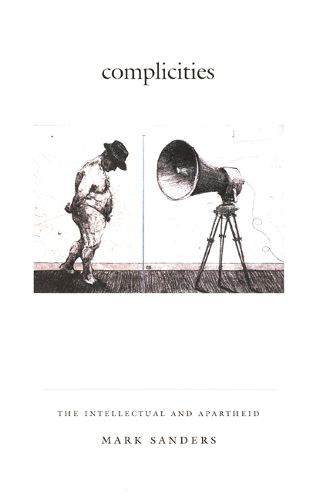Readings Newsletter
Become a Readings Member to make your shopping experience even easier.
Sign in or sign up for free!
You’re not far away from qualifying for FREE standard shipping within Australia
You’ve qualified for FREE standard shipping within Australia
The cart is loading…






Complicities explores the complicated-even contradictory-position of the intellectual who takes a stand against political policies and ideologies. Mark Sanders argues that intellectuals cannot avoid some degree of complicity in what they oppose, and that responsibility can only be achieved with their acknowledgment of this complicity. He examines the role of South African apartheid-era intellectuals by looking at the work of a number of key figures-both supporters and opponents-in English, Afrikaans, and Xhosa. Drawing on theorists including Derrida, Sartre, and Fanon, and paying particular attention to the linguistic intricacy of the literary and political texts considered, Sanders shows how complicity emerges as a problem for intellectuals across the ideological and social spectrum. He gives detailed analyses of widely divergent figures-Afrikaner nationalist poet N. P. van Wyk Louw, Drum writer Bloke Modisane, Xhosa novelist A. C. Jordan, Afrikaner dissident Breyten Breytenbach, and Black Consciousness leader Steve Biko. Opening with a discussion of colonial intellectuals Olive Schreiner and Sol T. Plaatje, and concluding with a reading of post-apartheid feminist critiques of the Truth and Reconciliation Commission, he reveals how sexual difference joins with race to further complicate issues of collusion. Complicities sheds new light on the history and literature of twentieth-century South Africa as it weighs into debates about the role of the intellectual in public life.
$9.00 standard shipping within Australia
FREE standard shipping within Australia for orders over $100.00
Express & International shipping calculated at checkout
Complicities explores the complicated-even contradictory-position of the intellectual who takes a stand against political policies and ideologies. Mark Sanders argues that intellectuals cannot avoid some degree of complicity in what they oppose, and that responsibility can only be achieved with their acknowledgment of this complicity. He examines the role of South African apartheid-era intellectuals by looking at the work of a number of key figures-both supporters and opponents-in English, Afrikaans, and Xhosa. Drawing on theorists including Derrida, Sartre, and Fanon, and paying particular attention to the linguistic intricacy of the literary and political texts considered, Sanders shows how complicity emerges as a problem for intellectuals across the ideological and social spectrum. He gives detailed analyses of widely divergent figures-Afrikaner nationalist poet N. P. van Wyk Louw, Drum writer Bloke Modisane, Xhosa novelist A. C. Jordan, Afrikaner dissident Breyten Breytenbach, and Black Consciousness leader Steve Biko. Opening with a discussion of colonial intellectuals Olive Schreiner and Sol T. Plaatje, and concluding with a reading of post-apartheid feminist critiques of the Truth and Reconciliation Commission, he reveals how sexual difference joins with race to further complicate issues of collusion. Complicities sheds new light on the history and literature of twentieth-century South Africa as it weighs into debates about the role of the intellectual in public life.